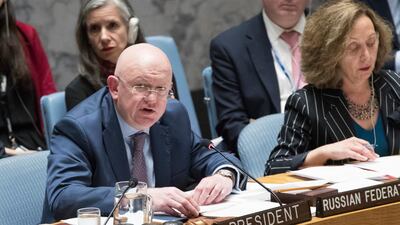Russia’s ambassador to the United Nations warned on Monday that a British-led attempt to beef up the global chemical weapons watchdog, including giving it the job of determining blame for chemical attacks, is “dangerous” and could damage peace efforts in Syria.
Vassily Nebenzia said he hoped supporters of the effort would realise they are undermining The Hague, Netherlands-based watchdog, the Organisation for the Prohibition of Chemical Weapons, as well as encroaching on the “province of the Security Council”.
Mr Nebenzia, who is president of the Security Council this month, told the Associated Press he raised the issue in consultations on Monday, and planned to do so again because there was interest in continuing the discussion.
The watchdog’s executive council announced last week that a special session of the 192 parties to the Chemical Weapons Convention would take place on June 26 and 27, after a request by more than the required 64 state parties.
British foreign minister Boris Johnson announced the move to convene a special session last month, saying it was “in response to shocking recent chemical attacks”, including those in the English city of Salisbury, in Syria’s civil war, and by the Islamic State group in Iraq. Britain has accused Russia of using a nerve agent in March in the attempted assassination in Salisbury of former spy Sergei Skripal, which Moscow denies.
The OPCW currently has a mandate to carry out investigations to determine only if chemical weapons have been used, but not to determine responsibility.
The Security Council established a joint UN-OPCW investigative team to determine responsibility for chemical attacks in Syria. But Russia vetoed a western-backed resolution in November that would have renewed the joint team’s mandate. Since then efforts to replace it have failed, making accountability exceedingly difficult to prove.
The joint team accused Syria of using chlorine gas in at least two attacks in 2014 and 2015 and the nerve agent sarin in an aerial attack on Khan Sheikhoun in April last year that killed about 100 people and affected injured 200 more. The latter attack led to a US air strike on a Syrian airfield.
The team also accused the ISIS extremist group of twice using mustard gas, in 2015 and 2016.
Mr Nebenzia was sharply critical of the team’s investigative methods at the time and said it “became a puppet in the hands of anti-Damascus forces”.
OPCW director general Ahmet Uzumcu has indicated support for having his agency determine responsibility for chemical attacks. He was quoted as telling London’s Chatham House think tank last month: “Today there might be good reasons actually to clarify the role of the OPCW itself in terms of attribution once it has the necessary information at its disposal. Wilful defiance of a valued norm should not be allowed to go unchallenged.”
Mr Nebenzia on Monday adamantly opposed any OPCW action at the special session.
“This is a very dangerous development — institutional and political — and that may seriously affect the Syrian political process if they succeed in their plans,” he said.
“This is wrong because the only body that can authorise attribution is the Security Council — not the OPCW as an organisation, nor the Chemical Weapons Convention provide for this,” the ambassador said.
“So that means we have to reopen the [convention] at least, and secondly this is not an organisation that is entrusted or equipped to do attribution.”

